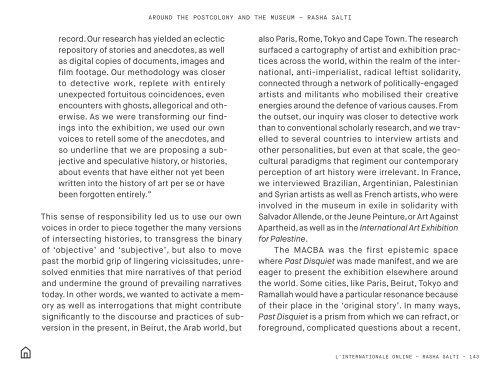DECOLONISING MUSEUMS
decolonisingmuseums_pdf-final
decolonisingmuseums_pdf-final
Create successful ePaper yourself
Turn your PDF publications into a flip-book with our unique Google optimized e-Paper software.
AROUND THE POSTCOLONY AND THE MUSEUM – RASHA SALTI<br />
record. Our research has yielded an eclectic<br />
repository of stories and anecdotes, as well<br />
as digital copies of documents, images and<br />
film footage. Our methodology was closer<br />
to detective work, replete with entirely<br />
unexpected fortuitous coincidences, even<br />
encounters with ghosts, allegorical and otherwise.<br />
As we were transforming our findings<br />
into the exhibition, we used our own<br />
voices to retell some of the anecdotes, and<br />
so underline that we are proposing a subjective<br />
and speculative history, or histories,<br />
about events that have either not yet been<br />
written into the history of art per se or have<br />
been forgotten entirely.”<br />
This sense of responsibility led us to use our own<br />
voices in order to piece together the many versions<br />
of intersecting histories, to transgress the binary<br />
of ‘objective’ and ‘subjective’, but also to move<br />
past the morbid grip of lingering vicissitudes, unresolved<br />
enmities that mire narratives of that period<br />
and undermine the ground of prevailing narratives<br />
today. In other words, we wanted to activate a memory<br />
as well as interrogations that might contribute<br />
significantly to the discourse and practices of subversion<br />
in the present, in Beirut, the Arab world, but<br />
also Paris, Rome, Tokyo and Cape Town. The research<br />
surfaced a cartography of artist and exhibition practices<br />
across the world, within the realm of the international,<br />
anti-imperialist, radical leftist solidarity,<br />
connected through a network of politically-engaged<br />
artists and militants who mobilised their creative<br />
energies around the defence of various causes. From<br />
the outset, our inquiry was closer to detective work<br />
than to conventional scholarly research, and we travelled<br />
to several countries to interview artists and<br />
other personalities, but even at that scale, the geocultural<br />
paradigms that regiment our contemporary<br />
perception of art history were irrelevant. In France,<br />
we interviewed Brazilian, Argentinian, Palestinian<br />
and Syrian artists as well as French artists, who were<br />
involved in the museum in exile in solidarity with<br />
Salvador Allende, or the Jeune Peinture, or Art Against<br />
Apartheid, as well as in the International Art Exhibition<br />
for Palestine.<br />
The MACBA was the first epistemic space<br />
where Past Disquiet was made manifest, and we are<br />
eager to present the exhibition elsewhere around<br />
the world. Some cities, like Paris, Beirut, Tokyo and<br />
Ramallah would have a particular resonance because<br />
of their place in the ‘original story’. In many ways,<br />
Past Disquiet is a prism from which we can refract, or<br />
foreground, complicated questions about a recent,<br />
L’INTERNATIONALE ONLINE – RASHA SALTI – 143


